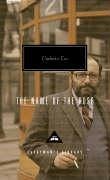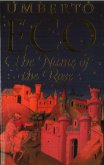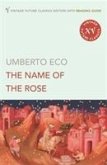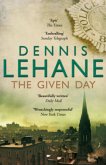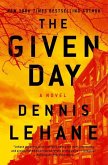Who is killing monks in a great medieval abbey famed for its library - and why? Brother William of Baskerville is sent to find out, taking with him the assistant who later tells the tale of his investigations. This story combines elements of detective fiction, metaphysical thriller, post-modernist puzzle and historical novel.
Hinweis: Dieser Artikel kann nur an eine deutsche Lieferadresse ausgeliefert werden.
Hinweis: Dieser Artikel kann nur an eine deutsche Lieferadresse ausgeliefert werden.
"Explodes with pyrotechnic inventions, literally as well as figuratively. Hold on till the end." - New York Times
"Like the labyrinthine library at its heart, this brilliant novel has many cunning passages and secret chambers . . . Fascinating . . . ingenious . . . dazzling." - Newsweek
"The Name of the Rose succeeds at being amusing and ambitious at the same time. It can be regarded as a philosophical novel masked as a detective story, or a detective story masked as a historical novel, or even better as a blend of all three. The venture sounds improbable, but Eco carries it out." - New York Review of Books
"A brilliantly conceived adventure into another time, an intelligent and complex novel, a lively and well-plotted mystery." - San Francisco Chronicle
"Whether you're into Sherlock Holmes, Montaillou, Borges, the nouvelle critique, the Rule of St. Benedict, metaphysics, library design, or The Thing from the Crypt, you'll love it. Who can that miss out?" - Sunday Times (London)
"Unfolds in an atmosphere thick with hostility and intrigue . . . Although The Name of the Rose is not a story of semiotics, Eco the novelist shares with Eco the semiotician a feeling for the world as a place rich with possible meanings." - Christian Science Monitor
"Like the labyrinthine library at its heart, this brilliant novel has many cunning passages and secret chambers . . . Fascinating . . . ingenious . . . dazzling." - Newsweek
"The Name of the Rose succeeds at being amusing and ambitious at the same time. It can be regarded as a philosophical novel masked as a detective story, or a detective story masked as a historical novel, or even better as a blend of all three. The venture sounds improbable, but Eco carries it out." - New York Review of Books
"A brilliantly conceived adventure into another time, an intelligent and complex novel, a lively and well-plotted mystery." - San Francisco Chronicle
"Whether you're into Sherlock Holmes, Montaillou, Borges, the nouvelle critique, the Rule of St. Benedict, metaphysics, library design, or The Thing from the Crypt, you'll love it. Who can that miss out?" - Sunday Times (London)
"Unfolds in an atmosphere thick with hostility and intrigue . . . Although The Name of the Rose is not a story of semiotics, Eco the novelist shares with Eco the semiotician a feeling for the world as a place rich with possible meanings." - Christian Science Monitor

